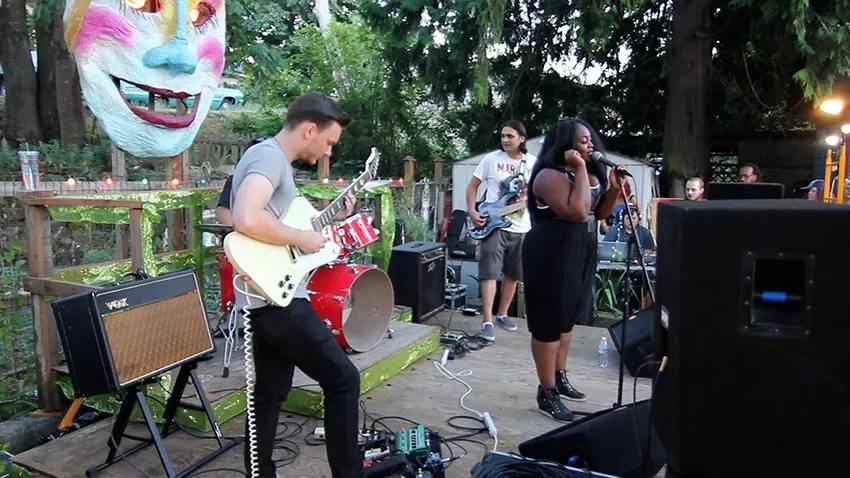Music lovers, rejoice! Music festivals, especially outdoor ones, will very likely be back in the next couple of months. A few venues have posted their schedules, and life is starting to "sound" more familiar.
One influential festival that couldn't be held last year is Hoodstock. For the twelfth year (minus last year), Hoodstock has been introducing Black music artists, especially up-and-coming ones, to a lot of other Black musicians and fans.
This year it will be on July 31, starting around 3:00 p.m. (There are other festivals with the same name, including one on Hood Canal. Those are not this.)
Organizer Selena Whitaker-Paquiet described the origins of the festival. "In 2007, I was in a band, NighTraiN, an all-woman-of-color rock band. We started out in the punk rock genre, but it was really hard to make money in the clubs. We wrote original music, and were also somewhat socially aware... and our music was commentary."
She and a few friends wanted a place that new and innovative bands could play and get some recognition. "Our thoughts were, 'Let's have a party where the bands we know and like can come together and play, and people give some money that goes directly to the band. No 50% of the door or two-drink-minimum. And wouldn't it be fun!'...
"We wanted to create an environment where people could make money and also be 'seen.' So we made Hoodstock! Our first year was NighTraiN and several other bands. One band, Bob and Dangerous Brothers – a punky, rocky space-age band that's difficult to classify – had the lead singer (a male) wearing a '50s woman's dress suit, a little skirt with a jacket. It was hilarious. They made fun of themselves; their drummer wore an aluminum antenna on his head. They wanted to remind you of when you were a kid and nothing mattered and you dressed up and had fun."
"It was $5 and you got a hot dog and a soda," she continued. "It was about who wants to come play. Our first show lasted about two hours. My daughter dealt with the hot dogs and a soda, and she was pregnant at that show. It's been a family affair (ever since)."
"It was about good music," she added. "A lot of times it ends up being people of color, because it's hard [for them] to get recognized for their talent. They're immediately labeled. Like, 'Oh, they're just going to be doing rap' or 'I don't want to hear angry music.' And it isn't about anger. It's about communication that everyone can relate to."
A neighborhood launching pad
This is hardly a festival for thousands of people. It's actually in Whitaker-Paquiet's backyard! To make sure her neighbors weren't bothered, she said, "we'd walk with my dogs and grandchildren and go door to door in a four-block radius and make flyers and knock on everyone's door and [say] here's your invitation (for free to the neighbors as a thank-you for the inconvenience for the noise and parking). Now, they're like, 'Oh! Is it Hoodstock? Thanks for the flyer!' We've gotten to know so many neighbors that when we walk the 'hood, we find out who's moved out, who's moved in.
"People really want us not to stop doing this. I advertise it as being a family affair. We barbeque and offer food for donation. Suggested amounts go to the [various] band members. We're suggesting $15-20 and you'll get to see ten-plus bands. We start at 3:00 p.m. and try to be done by 9:00 p.m.
"It's a full-fledged concert. We build a stage, there are amps – we try not to be blaring, but the people immediately around definitely hear it." Whitaker-Paquiet said that they have had as many as 200 people in attendance, and that means she has to hire security.
New bands are found by getting recommendations from musician friends. As Whitaker-Paquiet said, "We listen to everybody. The committee now is me, Taryn Dorsey – who used to be the drummer for NighTraiN – and Tim Lennon, who is at Langston Hughes Performing Arts Center. It's music that we like, and we want people to hear something new."
"We love seeing bands become successful," she added. "We've had some of Seattle's favorite bands come out of Hoodstock: the Blacktones, Bear Ax, Tres Leches. They all had their style and talent, and people just needed to hear them.
"For many of the bands that came from early Hoodstock days, they've said it was a launching pad, getting better audiences, more audiences, better shows, like at The Comet, Crocodile, or Neumo's, and hooking up with other bands and going on tour. The exposure was important to them. It was like a blossoming bud and branching out to different places.
"What's always been important to us is bringing out new styles, new music. NighTraiN... started our own genre. We called ourselves punk funk. Hoodstock was encouraging people to do their own sound and not changing [themselves] to fit into some genre that wasn't who they are.
If this sounds like a festival you can't miss, you have to be "in the know..." If you're in the Central District and ask around about "the MLKy Way House," you'll find it. Maybe you'll find a band you love and want to encourage, which sounds like the best part of being in the 'hood!


